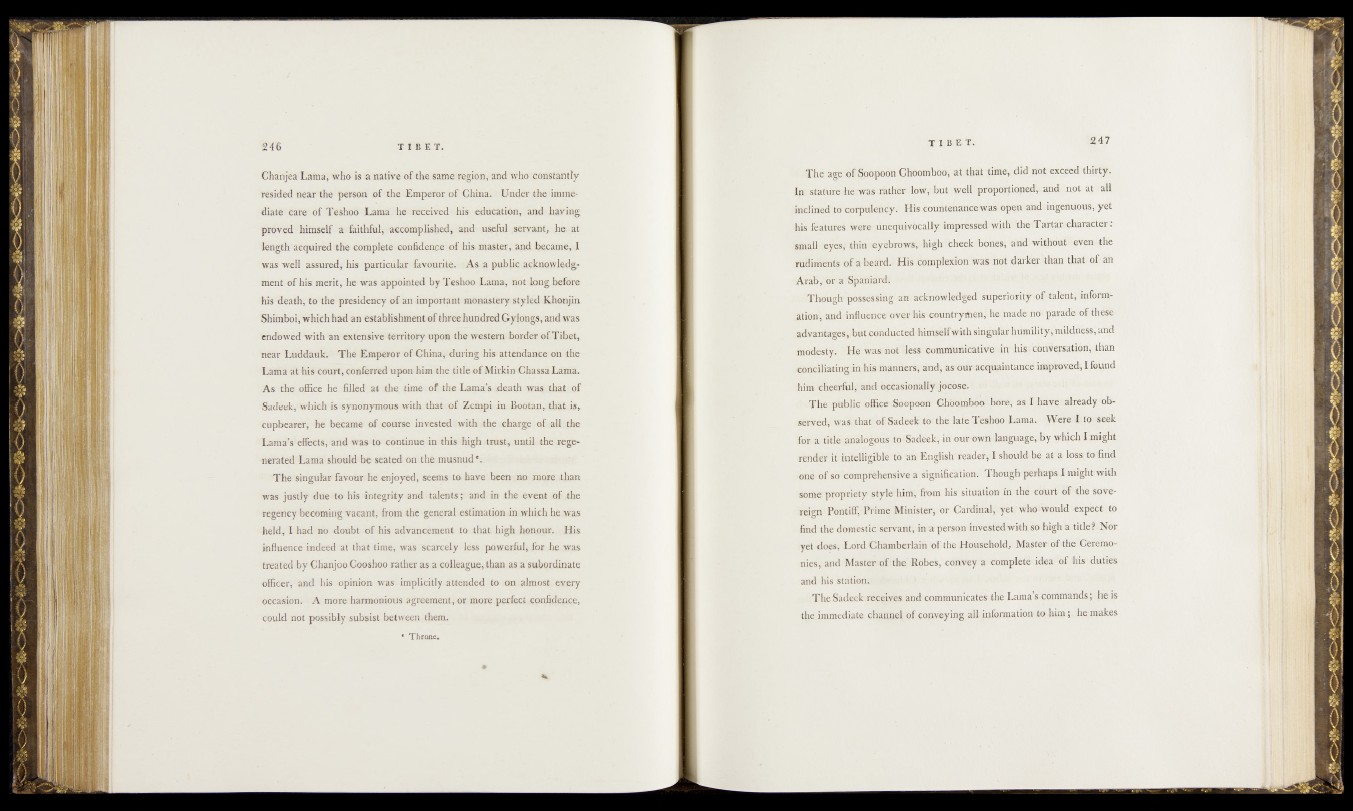
Chanjea I.ama, who is a native of the same region, and who constantly
resided near the person of the Emperor of China. Under the immediate
care of Teshoo Lama'. he received -his education, and haying
proved himself a faithfol, accomplished, and useful servant, he at
length acquired the complete confidence of his master, and became, I
was well assured, his particular favourite. As a public acknowledgment
of his merit, he was appointed by Teshoo Lama, not long before
his death, to the presidency of an important monastery styled Khonjin
Shimboi, which had an establishment of three hundred Gyiongs, and was
endowed with an extensive territory upon the western border of Tibet,
near Luddauk. The Emperor of China, during his attendance on the
Lama at his court, conferred upon him the title of Miririn Ghassa Lama.
As the office he filled at the time of the Lama s .death was that of
Sadeek, which is synonymous with that of Zempi injffimtap,. $hat is,
cupbearer, he became of course invested with .the charge of all the
LamaV effects, and was to continue in this high trust, until the regenerated
Lama should- be seated on the musnud *.
The 'singular -favour-he enjoyed, seems to have been, no more, ihan
was justly due to his integrity and talents; and in the event of tthe
regency becoming vacant, from the general estimation in which he. was
held, I had no doubt of his advancement to that high honour. His
influence indeed at that time, was scarcely less powerful, for he was
treated by Chanjoo.Cooshoo rather as a colleague, than as a subordinate
officer, and bis opinion was implicitly attended to on almost every
occasion. A more harmonious agreement, or more perfect confidence,
could not possibly subsist between,them.
* Throne.
The age .of Spopoon Ghbomiboo, at :that time, did not exceed thirty.
Ip stature he‘was ratheir low, -but ' well proportioned1,. andi 'npUat all
inclined’to corpuleftdy. His countenance was open andeiftgenuotiS', yet
his features were unequivocally'impressed with the'-Tartir-’chat-acteri.
■ small eyes; thin eyebrows, high'cheek'bonesf, and without leven^hfe
rudiments of a beard. His complexion Was1-not darker than tbaftofiaft
Arab, or a Spaniard;'
-•/Though-possessing an ackiMWàley;gëdrïsû^e«î'0j*y#OfhàIb0t-;rkifô«ïf-
,ation, and influence' over his'countrymen,' he«madévn'o'i parade 'of ihese
advantages, but conducted* himself with singular humility-* mildness, and
modesty. He was not less communicative' iw his<bbûv^îSàtion,..than
conciliating in his manners, and; as “our acquaintance improved, I-fdupd
himieheerfulyand occasionally.jocose.1 *■
The {piibliU1'office Soopoon Ghoomboo-bftVe, as Lhave already observed,
was that of Sadeek to’ the lateTeshoo Lama. Were L to. .seek
for a tide analogous tpiSadeek, in'our own-knguage^Bÿ which*1 might
render it intelligible to aft English' readeryf shfeûidibe at% te&â^ttffind
one of so compréhensive a‘ signification. Though perhaps I mights with
some propriety style1 him, from His situation iftflhè cbftrt of the sovereign
Pontiff, Prime Minister, or Cardinal; yètrwlKÜWould'expéct' to
find the domestic servant; inwpersaninVestëd with so high atitief/Mor
,yet does, Lord Chamberlain -of the Household, Mastes of t^^Elerif&o-.
nies, and Masterrof the/Rpbes, convey a complété- idea of 'his1'duties
„and his ststttcWbp^
The Sadeek receives and communicates- the Lama’slftotriniandsytliels
the immediate channel of conveying .all informationi-to him ;yfôe*makes